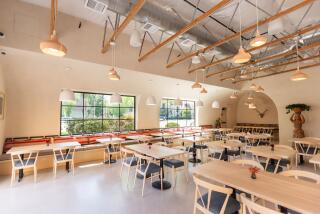Off-Site Preparation Poses Health Risks
- Share via
There’s something about a home-cooked meal that makes mouths water and brings back memories of days when Mom slaved away in the kitchen to make your favorite meal.
But Orange County health officials are warning diners to be wary of home-cooked delicacies served at local restaurants. Although health inspectors check out restaurant kitchens several times a year for cleanliness, they cannot vouch for the safety of kitchens where homemade foods are prepared.
“We get very concerned about home-prepared foods that are served in a restaurant because they’re prepared in an environment that we can’t inspect,” said Bill Ford, who oversees restaurant inspections for the Orange County Health Care Agency.
And Ford notes that food temperature, types of storage and cleanliness of the preparation area make the difference between healthful and dangerous eating.
Officials said they are most concerned about fancy desserts and specialty items like tamales and some pickled vegetables that are prepared in homes and brought to restaurants for sale.
Delicacies that come out during certain times of the year--like Vietnamese specialties served during the Tet festival--are also of concern, Ford said.
Some restaurant owners have even been known to slaughter their own fresh meat in backyards instead of at government-approved slaughtering plants, officials said.
“Home-cooking problems happen more so in some of our ethnic restaurants than others,” Ford said. But caterers who run their businesses from home are a problem that crosses all ethnic barriers, he said.
“We’ve seen bakeries and catering operations in garages,” Ford said, “and a typical garage--like my garage--has motor oil, dust, pesticides, things that shouldn’t be around food-preparation areas.”
Caterers can use their homes as offices, but it is illegal to cook or store food for commercial use there, Ford said.
Palu Tanna, who has been in the restaurant business for several years and owns Erhart’s Catering in Cypress, knows the rules and follows them carefully.
He offers full-service catering, supervises a staff of 40 and maintains a professional kitchen. About every 60 days, Erhart’s gets surprise spot checks from a health inspector.
“When he walks in, we’re really not worried,” Tanna said. “We have a good relationship because we run a pretty clean ship over here. When they want it done, it gets done.”
Tanna worries about caterers who don’t follow the rules, because they can present health hazards to their customers.
“People don’t realize the danger is not even in the kitchen or in the garage. It’s when they are transporting it,” Tanna said.
“How do you transport it 50 miles away and serve it four hours later somewhere in the middle of the park and keep the food fresh?”
Erhart’s biggest expense has been buying equipment that holds food to the appropriate standards of temperature and cleanliness.
When inspectors spot health and safety code violations, they immediately write up citations, destroy the damaged foods and, if the problems persist over time, suspend permits until they’re corrected.
Customers can file complaints against restaurants by calling the Health Care Agency at (714) 667-3600.
“Consumer complaints are our highest priority,” Ford said, “and we follow every one up.”


